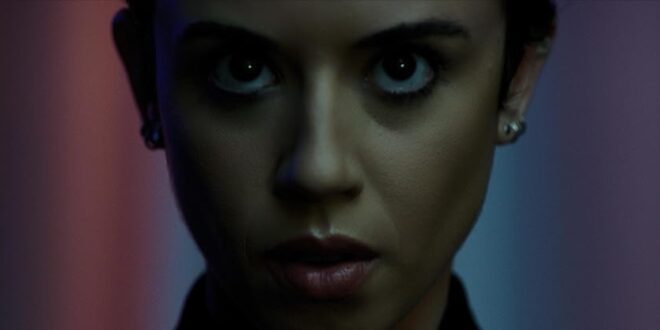My first introduction to Jenna Kanell was in 2017’s The Bye Bye Man. I know that film gets a ton of shit but I’m not gonna lie. I fucking love it. While Jenna is most known for her role as Tara in 2016’s Terrifier, it’s her role as Kim in Stacy Title’s The Bye Bye Man that sticks with me the most and made me a fan.
I was super excited to see that Jenna not only had a starring role in a new film, but that she also wrote it AND did all of her own stunts! In Faceless After Dark, Jenna plays Bowie, an actor battling a killer clown:
Following her breakout success in a killer clown horror flick, Bowie finds herself held hostage by an unhinged fan determined to recreate the film’s fatal plot.
To celebrate the release of the film, I chatted with Jenna via Zoom about how the project came about, doing her own stunt work, working with her brother, horror films, and more!
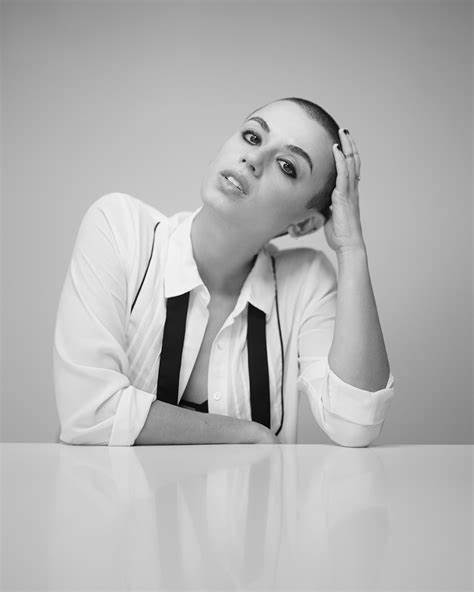
PopHorror: I loved Faceless After Dark. I’m so excited to talk to you about it.
Jenna Kanell: Yay! Thank you!
PopHorror: I’m a huge fan so this is really exciting. I’m actually staring at a poster of The Bye Bye Man.
Jenna Kanell: Amazing! You’re a real one.
PopHorror: What inspired Faceless After Dark and how did the project come about?
Jenna Kanell: Originally, the film came about because an investor approached Raymond Wood, the director, and wanted a killer clown movie. So, Ray came to me because we’d been working together for years and we’d been friends for a long time – and also because of my work in the original Terrifier film – and asked if I would be interested coming on board not only to act in it, but also to co-write it with Todd Jacobs, who was my co-writer at the time. At first I was hesitant because I wasn’t trying to get stuck just running from clowns my entire life, as grateful as I am for those experiences. We ended up taking it on as a challenge and basically saying is there a world in which we can write a clown movie that’s subversive of the genre and meta and something either new completely, or something that’s been done before but to do it in a unique, original way.
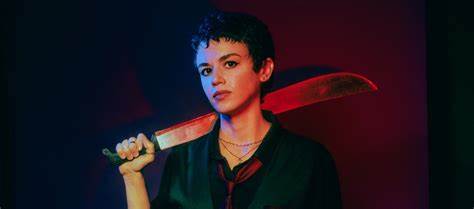
PopHorror: It’s funny because I wouldn’t even call this a killer clown movie. The killer clown part of it is so small. It’s so much more than that. I like the direction that you took it.
Jenna Kanell: Thank you, thank you so much! The Google doc that we were working off of for the longest time when we were outlining and things like that was titled, “Not Another Fucking Clown Movie.”
PopHorror: I love that!
Jenna Kanell: Thank you!
PopHorror: Was Bowie Davidson a nod to David Bowie?
Jenna Kanell: Absolutely! Very much so. Todd and I are both huge fans of David Bowie. Ray is as well, and it was sort of meant to be a nod to not only him as an artist, but also the ways in which he subverted gender because their relationship to gender performance is very much a part of how Bowie navigates who they are and how they identify and how they present versus the box that their industry maybe wants to put them in.
PopHorror: I love that a lot. That is so cool.
Jenna Kanell: Thank you!
PopHorror: When writing the script, did you write it with you in mind for Bowie?
Jenna Kanell: That was originally part of the pitch. Ray basically wanted me to write something that I would want to act in as well. It would be funny if I was writing for someone else and I said, “No! This is mine now! Just kidding,” and push everyone aside.
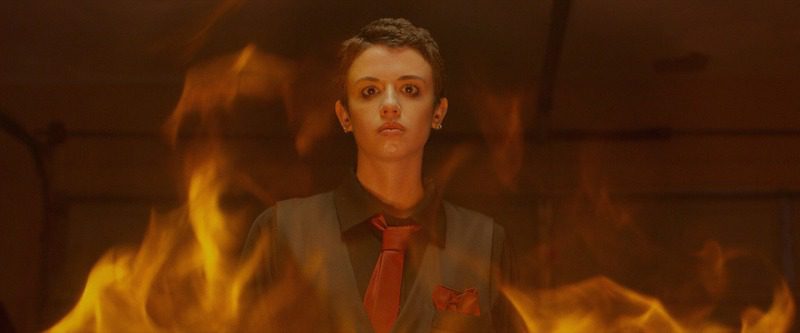
PopHorror: You never know!
Jenna Kanell: No, that’s true. That does happen, it definitely does happen. It was the intention from the start for me to also act in it and do stunts in it. And in some ways, that presented a lot of possibilities because it meant that I could truly expand a character in a world that I had wanted to be in and wanted to watch as a horror/thriller fan, but it also presents challenges because it’s harder to write something when you know it’s going to be your face. But that’s something that was very helpful to have both Ray and Todd there to make sure it wasn’t… It was very important to me that it wasn’t a vanity piece and that it wasn’t about… I had to be unafraid to get ugly because I thought that was part of what brings it to life.
PopHorror: Before this, I had no idea that you do your own stunts. I think that is completely badass. You don’t see that very often.
Jenna Kanell: Thank you!
PopHorror: I love that you do that. How do you train for a role like this, where you not only wrote it, but star in it and do all of your own stunts? How do you prepare for that?
Jenna Kanell: Thank you so much. I love stunts. Action sequences are my absolute favorite things to do and again, to kind of go back to your last question too, it was the sort of thing that because we were writing for myself, we could say here are the stunt strengths, the actions strengths I have and play on that sort of thing in order to work with Brent Bernhard, our stunt coordinator, to play into my strengths and how I actually move and my sense of blocking and spatial awareness. In terms of training, on an ongoing basis I do kickboxing and Muay Thai more recently. I used to do Krav Maga and in the past when I was younger, I did other kinds of martial arts and mixed martial arts, and I’ve done some stunt specific training in the past in terms of working on harness or working in water, stunt driving. I got my motorcycle license for a movie once. But training for this one was mostly just staying in shape and continuing to do my normal fight training but then also to work closely with Brent like I was talking about to really make sure we had all of the choreography locked in and feeling authentic and real while also being safe. Safety was hugely important to us. That was a big part of preparing for it.
PopHorror: I think that’s so cool.
Jenna Kanell: Thank you! It’s kind of like a dance in a lot of ways, the choreography.
PopHorror: In preparation of talking to you today and watching the movie, I read another interview that you did that you wanted to make clear that this was not drawn from real life. But you did mention that you had had a stalker situation in the past and you also talked about your own mental health. Did you find that making this movie was cathartic for you?
Jenna Kanell: Absolutely. Making this movie was hugely cathartic. Most of the film, as you probably read, is fictionalized, but there are a lot of elements like you mentioned, that I did draw from, situations that I’ve had with people in real life, operating as someone female presenting in a patriarchal society and with rape cultural and all of that good stuff, I say ironically of course. I did find it hugely cathartic. I do actually live with depression and anxiety myself and do have some home invasion trauma from my past, and like you mentioned, a bit of a stalker scare a couple years ago. So, it was fun to get out my anger in a lot of ways and to kind of almost in an immersion therapy sort of way, face off against some of the things I’m afraid or uncomfortable with or just fucking pissed about.
PopHorror: I’m glad that you decided to take on something like this and not shy away from it because I think that shows a lot of strength and I love that you used it in making your art and using this as a kind of therapy for yourself. I really admire that. Thank you for sharing it.
Jenna Kanell: Of course, thank you for asking about it. My hope is that some people who watch it get a similar sort of catharsis.
PopHorror: Your brother Vance is also in this with you.
Jenna Kanell: Yes!
PopHorror: This is not your first project with him. I did read about Bumblebees.
Jenna Kanell: Bumblebees, yes!
PopHorror: I think that’s so super cool. What’s it like working with your family?
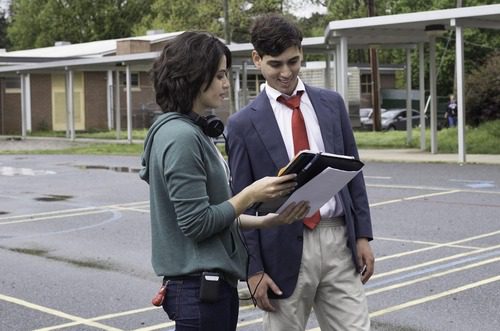
Jenna Kanell: I love him so much. I’m so proud of him. Well done on doing your research, by the way! He has a little cameo in the film as the convention fan. That scene, it was important to me to show that most, not all, but most of my experiences with fans are very positive and are very supportive and there is this sense of community in the horror world and the genre world in general. I wanted to illustrate that. That is the beautiful thing about conventions. I do meet a lot of people at conventions that are neurodivergent in some way and my brother is in real life so when we were trying to find someone who represented that part of that community, my answer was right in front of my face the whole time. I love working with him. He was in Bumblebees which was the first short I ever directed and wrote, and he’s not an actor but now I’ve dragged him into Faceless After Dark, I dragged him into a short I wrote, directed, and starred in with him in the last year called Spray Bottle that comes out this year. He’s a great actor because he couldn’t care less about acting. They talk a lot about nepotism in the film industry and I finally got to do nepotism myself! So that was quite exciting. I have no family in the industry at all so it was fun to be able to pull him on. I feel grateful that he trusts me because it can be a very overwhelming world, especially for someone like him who’s on the autism spectrum. There’s a lot of sensory input in every kind of way and I certainly always make an effort to make it a safe environment for him and as comfortable an environment as possible. It just means a lot that he trusts me to do that sort of thing.
PopHorror: That’s awesome! With Terrifier and The Bye Bye Man, and now with this movie, you’ve developed quite a following in the horror genre. Why do you feel so many people connect with horror?
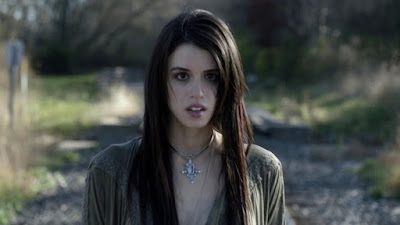
Jenna Kanell: I love this question because I feel qualified to answer it, not just because of my work within horror, but also because I’ve always loved genre films. At least my hypothesis on why people connect with genre and to horror in particular – a least why I did growing up and even into now – is that I think if you’re dealing with any sort of mental illness or even chronic pain or types of other both mental and physical pains, it’s a two-hour period where you’re taken away from those things. I used to have just nightmare periods and that’s how I got into horror. I was in so much pain and bleeding so much that I was staying home from school every month for a couple days and when I would watch the horror movies that were on TV – that I was probably too young to be watching, which I’m sure most horror people can relate to – for two hours I’m not thinking about how much pain I’m in or how depressed I am or about the fall of capitalism. For like two hours I’m just thinking about, are they going to get out of this house? Are they going to beat the killer? Are they going to survive? What’s going to happen? How’s it going to happen? It’s being taken out of your own body and being put into a different experience. And I think there’s a lot of universal things about horror. On top of that, horror has historically been the most inclusive of any genre. It’s historically been one of the first genres to include queer people and to include global majority people and to include these disabled people and these marginalized stories that only recently are we now starting to see in genres outside of horror. That’s my personal thesis on why I think people connect to it.
PopHorror: I agree with you 100%. That is one of the best answers I’ve ever heard. The horror genre is all encompassing. We welcome everyone. Just the number of queer filmmakers and the more queer movies coming out. You don’t see that in a lot of other genres. If it’s a comedy, that’s the first thing they use to market it. They make it this whole big thing like they have to prepare people and I feel like with horror, we don’t have to prepare them. We’re just like, “Oh, bring it. It’s going to be great.”
Jenna Kenall: Yeah, yeah, exactly! Like I just saw a baby cut in half. Do you think I’m going to be worried about a gay couple? The standards are just different, absolutely. And also, in dramas and other genres like you were saying, there is absolutely a place for these stories, but there’s been an oversaturation of coming out stories and of tragic queer stories and there is a place for those and they are still very important stories, but I think we’re all wanting to see things outside of that. Horror is just so much more of a playground in a lot of ways.
PopHorror: And if it’s a gay couple wielding knives and slashing into people, that’s even better.
Jenna Kanell: Even better! Shout out to Fright Night! Shout out to the original Fright Night.
PopHorror: Just one last question for you today. What’s your favorite scary movie?
Jenna Kanell: Oohh. I’m so glad you asked. My favorite horror movie of all time is John Carpenter’s The Thing. It’s so good. It holds up every time I rewatch it. The special effects, the practical effects, the puppetry, the sound design, the lighting, the way setting is a character, the script, the acting… Everything about it truly holds up. It’s so, so well done and so visceral. I think it will absolutely continue to stand the test of time.
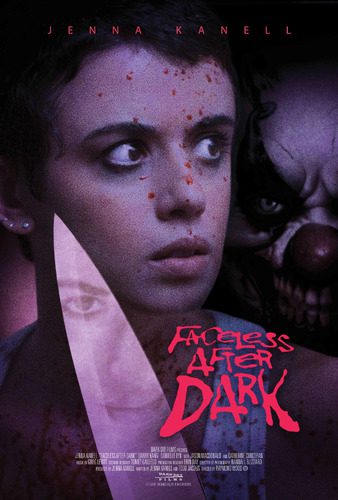
Thank you so much to Jenna for taking the time to speak with us. Faceless After Dark is in select theaters and Digital platforms now!
 PopHorror Let's Get Scared
PopHorror Let's Get Scared
